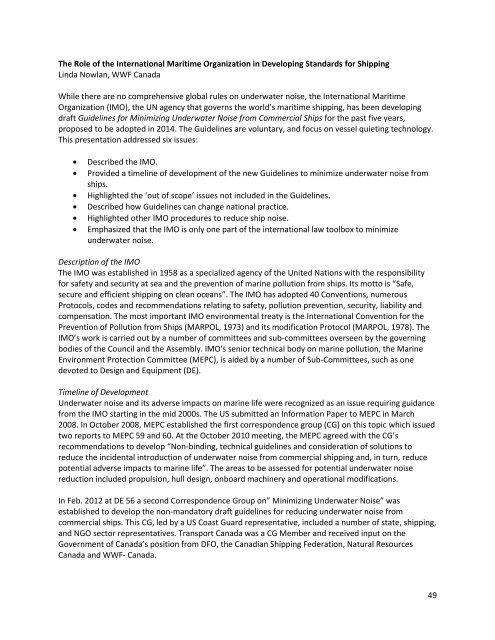mcbem-2014-01-submission-wwf-en
mcbem-2014-01-submission-wwf-en
mcbem-2014-01-submission-wwf-en
Create successful ePaper yourself
Turn your PDF publications into a flip-book with our unique Google optimized e-Paper software.
The Role of the International Maritime Organization in Developing Standards for Shipping<br />
Linda Nowlan, WWF Canada<br />
While there are no compreh<strong>en</strong>sive global rules on underwater noise, the International Maritime<br />
Organization (IMO), the UN ag<strong>en</strong>cy that governs the world’s maritime shipping, has be<strong>en</strong> developing<br />
draft Guidelines for Minimizing Underwater Noise from Commercial Ships for the past five years,<br />
proposed to be adopted in <strong>2<strong>01</strong>4</strong>. The Guidelines are voluntary, and focus on vessel quieting technology.<br />
This pres<strong>en</strong>tation addressed six issues:<br />
Described the IMO.<br />
Provided a timeline of developm<strong>en</strong>t of the new Guidelines to minimize underwater noise from<br />
ships.<br />
Highlighted the ‘out of scope’ issues not included in the Guidelines.<br />
Described how Guidelines can change national practice.<br />
Highlighted other IMO procedures to reduce ship noise.<br />
Emphasized that the IMO is only one part of the international law toolbox to minimize<br />
underwater noise.<br />
Description of the IMO<br />
The IMO was established in 1958 as a specialized ag<strong>en</strong>cy of the United Nations with the responsibility<br />
for safety and security at sea and the prev<strong>en</strong>tion of marine pollution from ships. Its motto is “Safe,<br />
secure and effici<strong>en</strong>t shipping on clean oceans”. The IMO has adopted 40 Conv<strong>en</strong>tions, numerous<br />
Protocols, codes and recomm<strong>en</strong>dations relating to safety, pollution prev<strong>en</strong>tion, security, liability and<br />
comp<strong>en</strong>sation. The most important IMO <strong>en</strong>vironm<strong>en</strong>tal treaty is the International Conv<strong>en</strong>tion for the<br />
Prev<strong>en</strong>tion of Pollution from Ships (MARPOL, 1973) and its modification Protocol (MARPOL, 1978). The<br />
IMO’s work is carried out by a number of committees and sub-committees overse<strong>en</strong> by the governing<br />
bodies of the Council and the Assembly. IMO's s<strong>en</strong>ior technical body on marine pollution, the Marine<br />
Environm<strong>en</strong>t Protection Committee (MEPC), is aided by a number of Sub-Committees, such as one<br />
devoted to Design and Equipm<strong>en</strong>t (DE).<br />
Timeline of Developm<strong>en</strong>t<br />
Underwater noise and its adverse impacts on marine life were recognized as an issue requiring guidance<br />
from the IMO starting in the mid 2000s. The US submitted an Information Paper to MEPC in March<br />
2008. In October 2008, MEPC established the first correspond<strong>en</strong>ce group (CG) on this topic which issued<br />
two reports to MEPC 59 and 60. At the October 2<strong>01</strong>0 meeting, the MEPC agreed with the CG’s<br />
recomm<strong>en</strong>dations to develop “Non-binding, technical guidelines and consideration of solutions to<br />
reduce the incid<strong>en</strong>tal introduction of underwater noise from commercial shipping and, in turn, reduce<br />
pot<strong>en</strong>tial adverse impacts to marine life”. The areas to be assessed for pot<strong>en</strong>tial underwater noise<br />
reduction included propulsion, hull design, onboard machinery and operational modifications.<br />
In Feb. 2<strong>01</strong>2 at DE 56 a second Correspond<strong>en</strong>ce Group on” Minimizing Underwater Noise” was<br />
established to develop the non-mandatory draft guidelines for reducing underwater noise from<br />
commercial ships. This CG, led by a US Coast Guard repres<strong>en</strong>tative, included a number of state, shipping,<br />
and NGO sector repres<strong>en</strong>tatives. Transport Canada was a CG Member and received input on the<br />
Governm<strong>en</strong>t of Canada’s position from DFO, the Canadian Shipping Federation, Natural Resources<br />
Canada and WWF- Canada.<br />
49


